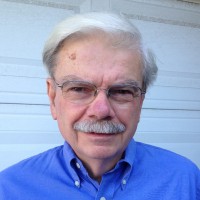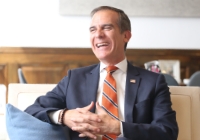GEORGE WASHINGTON WAS NOT ESPECIALLY FUNNY.
But he endorsed good humor. “It is assuredly better,” he wrote to a fellow Virginian, “to go laughing [rather] than crying thro’ the rough journey of life.”
His successor, John Adams, was better at making people chuckle. “In my many years,” Adams liked to say, “I have come to a conclusion that one useless man is a shame, two is a law firm, and three or more is a congress.”
Often when presidents make us laugh, we laugh at them, not with them. But sometimes they try to be funny. Occasionally their jokes work. Other times they don’t. For these words of humor from White House clowns, we are indebted to the Washington Post, Reader’s Digest and the Journal of the American Revolution.
Thomas Jefferson, whose personal version of the Bible deleted many mentions of the supernatural, said of John Adams: “He is as disinterested as the being who made him.”
Abraham Lincoln was not above poking fun at himself. “If I were two-faced,” he told critics, “would I be wearing this one?”
His successor, Andrew Johnson, voiced a lament that many people today understand. Washington, D.C., he said, is a city “bordered by reality.”
For Theodore Roosevelt, little hope was to be found in Congress. “When they call the roll in the Senate,” he said, “the senators do not know whether to answer ‘present’ or ‘guilty.’”
Struggles between liberals and conservatives are hardly new. Woodrow Wilson described conservatives this way: “A conservative is someone who makes no changes and consults his grandmother when in doubt.”
A taciturn New Englander, Calvin Coolidge had little to say about anything. At dinner one evening, a woman seated next to him said she had made a bet that she could get at least three words out of him.
“You lose,” he said.
Like Woodrow Wilson, Eleanor Roosevelt championed some liberal causes. One day, FDR was told in jest that she was in prison.
“I’m not surprised,” he said. “But what for?”
Harry S. Truman was born in Missouri and grew up on farms. He spoke one day at a Grange meeting and used the word “manure.” A friend turned to his wife, Bess, and said, “I wish you could get Harry to use a more genteel word.”
“Good Lord, Helen,” Bess replied. “It’s taken me years to get him to say ‘manure.’ “
Her admonition didn’t stick. Not long afterward, HST gave some life advice: “Never kick a fresh turd on a hot day.”
Dwight Eisenhower offered a bit of theology. “An atheist,” he said, “is a guy who watches a Notre Dame-SMU football game and doesn’t care who wins.”
Just like Lincoln, John Kennedy could be self-deprecating. One day, a little boy asked him how he became a war hero.
“It was absolutely involuntary,” Kennedy said. “They sank my boat.”
When he appointed his brother attorney general, he took criticism for nepotism. “I don’t see anything wrong,” he said, “with giving Bobby a little legal experience before he goes out on his own to practice law.”
Lyndon Johnson made Truman sound like a choir boy. LBJ asked economist John Kenneth Galbraith: “Did you ever think that making a speech on economics is a lot like pissing down your leg? It seems hot to you, but it never does to anyone else.”
Jimmy Carter, like Washington, was not a naturally funny person. He scored, though, after he had been president for a while.
“My esteem in this country has gone up substantially,” he said. “It is very nice now when people wave at me. They use all their fingers.”
Humor came more instinctively to his successor, Ronald Reagan. “Politics is supposed to be the second-oldest profession,” Reagan liked to say. “I have come to realize that it bears a very close resemblance to the first.”
He told antiwar protesters at UCLA: “‘Make love, not war?’ You don’t look like you could do much of either.”
Reagan was able to wisecrack under pressure. When he was shot in an assassination attempt, a bullet broke a rib, punctured a lung and caused serious internal bleeding. As surgeons surrounded him, he looked up and said:
“Please tell me you’re Republicans.”
To Bill Clinton, eight years in the White House were not entirely a joke. “I don’t know whether it’s the finest public housing in America or the crown jewel of the American penal system.”
Barack Obama learned to be careful with humor. He told a White House Correspondents Association dinner: “Some folks don’t think I spend enough time with Congress. ‘Why don’t you get a drink with Mitch McConnell?’ they ask. “Really? Why don’t you get a drink with Mitch McConnell?”
McConnell tweeted a picture of himself having a beer next to an empty barstool.
The president came off as mean. Obama discovered more about the unintended consequences of humor from citing proof of his birth in Hawaii and telling the correspondents:
“No one is happier, no one is prouder to put this birth certificate matter to rest than the Donald. That’s because he can finally get back to focusing on the issues that matter, like: Did we fake the moon landing?”
Donald Trump was in the audience. He had been claiming that Obama should not be in the White House because he was not born in the United States. Some say it was this humiliation by Obama that goaded him into running for president.
Reagan learned that presidential humor might even be dangerous. One day he did a sound check for a radio program. “My fellow Americans,” he said, “I’m pleased to tell you today that I’ve signed legislation that will outlaw Russia forever. We begin bombing in five minutes.”
He didn’t know the microphone was live.
———-
The Last Laugh:
“The trouble with practical jokes is that they very often get elected.”
— Will Rogers




















